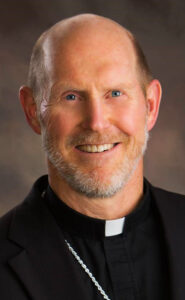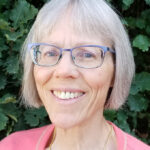By Barb Arland-Fye
The Catholic Messenger
DAVENPORT — Bishop Thomas Zinkula said he appreciated the respectful dialogue that he and his fellow bishops engaged in during discussions at their spring meeting about immigration, racism, young adult Catholics, religious freedom and other topics. The U.S. Conference of Catholic Bishops (USCCB) met June 13-14 in Fort Lauderdale, Fla.

The bishops care about people and about the issues that impact people’s lives, Bishop Zinkula said. “There was passion at the meeting about the issues and about people.” Equally important, “there was recognition that we can have respectful dialogue about controversial issues.”
Certainly, bishops have different views on the ways in which to address issues, but their civil discourse allowed for a deepening of perspectives. “I felt good about that. We listened to each other and didn’t use derogatory language,” Bishop Zinkula said. “We’re fallible human beings, but we can encounter each other in the way Pope Francis talks about. Some bishops said that was good modeling for society.”
Discussion about the unfolding immigration crisis demonstrated that the bishops care a lot about that issue, Bishop Zinkula said. They produced a statement criticizing the White House’s denial of protection to asylum seekers fleeing domestic or gang violence. The bishops also condemned separation of undocumented families at the border (President Donald Trump ended that policy a week after the USCCB meeting). Bishop Zinkula said the bishops discussed the possibility of taking symbolic action, such as having a presence at the border. “Some people thought the bishops should be more visible about their support for immigrants.”
The bishops also listened to three young adults who participated in a pre-Synod on Youth gathering at the Vatican in late March. “These are active, committed young Catholics. How can you not be inspired by them?” Bishop Zinkula said. They are an exception, however. “We’re all concerned about young people leaving the church and why.” The Synod on Youth, scheduled for October, will address those issues.
Bishop Zinkula and his fellow bishops also explored challenges to religious liberty and debated an update to “Forming Consciences for Faithful Citizenship,” their document on the political responsibility of Catholics. Some bishops thought the document should be rewritten to better reflect the signs of the times and the teachings of Pope Francis. Some viewed the document’s length as a deterrent to the faithful. The bishops debated the pros and cons of video. Following lengthy discussion, they agreed to develop materials and a video to supplement “Faithful Citizenship” and to apply the teachings of Pope Francis to our day, Bishop Zinkula said. They also talked about Religious Freedom Week, which is June 22-29.
In their ongoing efforts to confront racism, the USCCB reported at their spring meeting that a Statement on Racism should be ready for a vote at their fall meeting in Baltimore. Bryan Stevenson, a professor of clinical law and executive director of the Equal Justice Initiative, gave a talk to the bishops on racism. Bishop Zinkula had read Stevenson’s book “Just Mercy” and was impressed with the author’s insights and his talk. Stevenson spoke of the need to get closer to the marginalized, abused and neglected. He used the term “proximity,” which complements a term Pope Francis uses, “encounter,” Bishop Zinkula said. Stevenson also talked about changing the narrative. For example, when people of color are addicted, it’s a war on drugs; when white people are addicted, it’s a health problem. The social justice advocate advised the bishops to be hopeful in their approach to address racism. Hopelessness, he said, is the enemy of justice.
Racism and immigration were also topics of importance at the USCCB’s fall 2017 meeting. At that time, Bishop Zinkula identified actions Catholics can take to address both issues. Lobby local, state and national legislators to pass just laws and policies. Provide adult faith formation, including articles in The Catholic Messenger; talk about racism and immigration in parishes, Catholic schools and from the pulpit. Those efforts will go a long way toward fostering respectful dialogue on divisive issues.











